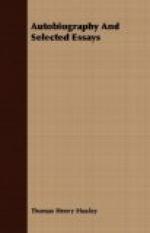Of his life after the completion of his medical course, of his search for work, of his appointment as assistant surgeon on board the Rattlesnake, and of his scientific work during the four years’ cruise, Huxley gives a vivid description in the autobiography. As a result of his investigations on this voyage, he published various essays which quickly secured for him a position in the scientific world as a naturalist of the first rank. A testimony of the value of this work was his election to membership in the Royal Society.
Although Huxley had now, at the age of twenty-six, won distinction in science, he soon discovered that it was not so easy to earn bread thereby. Nevertheless, to earn a living was most important if he were to accomplish the two objects which he had in view. He wished, in the first place, to marry Miss Henrietta Heathorn of Sydney, to whom he had become engaged when on the cruise with the Rattlesnake; his second object was to follow science as a profession. The struggle to find something connected with science which would pay was long and bitter; and only a resolute determination to win kept Huxley from abandoning it altogether. Uniform ill-luck met him everywhere. He has told in his autobiography of his troubles with the Admiralty in the endeavor to get his papers published, and of his failure there. He applied for a position to teach science in Toronto; being unsuccessful in this attempt, he applied successively for various professorships in the United Kingdom, and in this he was likewise unsuccessful. Some of his friends urged him to hold out, but others thought the fight an unequal one, and advised him to emigrate to Australia. He himself was tempted to practice medicine in Sydney; but to give up his purpose seemed to him like cowardice. On the other hand, to prolong the struggle indefinitely when he might quickly earn a living in other ways seemed like selfishness and an injustice to the woman to whom he had been for a long time engaged. Miss Heathorn, however, upheld him in his determination to pursue science; and his sister also, he writes, cheered him by her advice and encouragement to persist in the struggle. Something of the man’s heroic temper may be gathered from a letter which he wrote to Miss Heathorn when his affairs were darkest.




